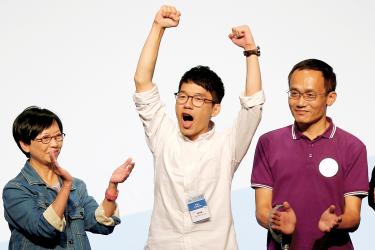A new generation of young Hong Kong politicians advocating a break from Beijing yesterday became lawmakers for the first time in a result likely to rattle China.
The Chinese government said it opposed efforts by certain candidates and organizations in Hong Kong to promote independence, the state-owned Xinhua news agency reported.
Yesterday’s poll was the biggest since mass pro-democracy rallies in 2014 failed to win concessions on political reform, leading to the emergence of a slew of new parties demanding more autonomy from Beijing.
The parties now have a foothold in the legislature with five young candidates backing independence or self-determination for Hong Kong taking seats.
Observers branded their victory “a strong message to Beijing,” which has railed against candidates supporting a split from China.
A record 2.2 million people voted in the territory-wide election for members of the Legislative Council, Hong Kong’s lawmaking body, as fears grow Beijing is tightening its grip on the semi-autonomous territory.
It was the highest turnout since Hong Kong was returned to China by Britain in 1997 under a handover agreement guaranteeing its freedoms for 50 years.
Many feel those liberties are already disappearing and young activists particularly have lost faith in the “one country, two systems” deal under which Hong Kong is governed.
At the forefront of the new guard in the council is Nathan Law (羅冠聰), 23, leader of the 2014 Umbrella movement rallies, who took more than 50,000 votes to become the council’s youngest member.
Law and his new party, Demosisto, are calling for a referendum on independence, emphasizing Hong Kongers’ right to choose whether they want to split from China.
“I think Hong Kongers really wanted change,” Law said, celebrating his win.” Young people have a sense of urgency when it comes to the future.”
With the pro-democracy camp divided between those who back the idea of possible independence and those who are more wary of the once taboo notion, Law said he would seek unity.
“We have to be united to fight against the [Chinese] Communist Party,” he said.
Law has previously distanced himself from the more radical “localist” movement, which includes activists who are stridently pro-independence and have in the past advocated violence.
Young campaigners have been galvanized by a number of incidents that have pointed to increased Beijing interference.
The most high-profile was the disappearance of five booksellers known for salacious titles about Beijing politicians. They resurfaced in detention in China.
There was also outrage after the loudest pro-independence voices were banned by the government from running for the council.
Some localists who were allowed to stand continued to call for independence on the campaign trail.
One of them, Yau Wai-Ching (游蕙禎) of new party Youngspiration, gained a seat saying Hong Kong had “the right to discuss its sovereignty.”
Another Youngspiration candidate, Baggio Leung (梁頌恆), who has openly supported independence, also took a seat.
Political analyst Willy Lam (林和立) said voters had backed the activists to “send a strong message to Beijing.”
“Beijing will be very unhappy about the results and it’s quite possible that they may use this as a pretext to squeeze Hong Kong even harder,” he said.
Political commentator Joseph Cheng (鄭宇碩) said he expected Beijing to adopt a “very hawkish position” and that authorities could seek to disqualify any legislator advocating a split from China.
Hong Kong and Beijing officials have consistently slammed independence as unconstitutional.
Most pro-democracy politicians do not support the notion of independence and there were concerns in the democratic camp that new activists would split the vote, triggering overall losses.
Although some veteran pro-democracy politicians were voted out to make way for the younger generation, the democratic camp including independence activists managed to retain a hold on a third of seats in the congress, giving them veto power over key bills.
Source: Taipei Times - 2016/09/06





















